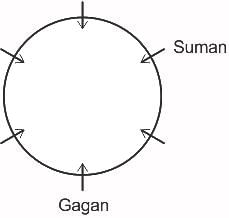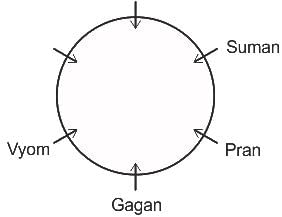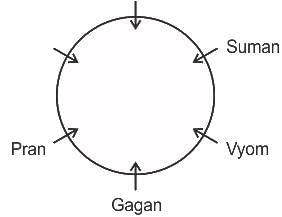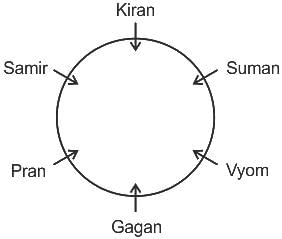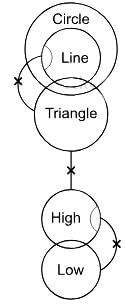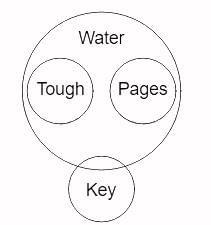Maths & Logical Reasoning Test - 5 - SSC CGL MCQ
30 Questions MCQ Test - Maths & Logical Reasoning Test - 5
x, y be two acute angles, x + y < 90° and sin(3x - 20°) = cos(3y + 20°), the value of  is:
is:
A train takes 7 seconds to pass man standing on a platform and another train whose length is double that of the first train, and moving in the opposite direction, takes 10 seconds to pass him. The time taken (in seconds, to the nearest integer) by the trains to pass each other will be:
| 1 Crore+ students have signed up on EduRev. Have you? Download the App |
ΔABC and ΔXYZ are equilateral triangles of 54 cm sides. All smaller triangles like ΔANM, ΔOCP, ΔQPX etc are also equilateral triangles. Find the area of the shape MNOPQRM.
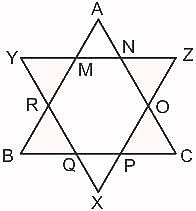

Three years ago, the ratio of the ages of P and Q was 7 ꓽ 8 respectively. After nine years from now, the ratio of their age will be 11 ꓽ 12 respectively. What was the age (in years) of Q 5 years ago?
If A gives 5 of his chocolates to B and C in the respective ratio of 4 : 1, what will be the new respective ratio of the number of chocolates with B and C?
A Circle C1 circumscribes a triangle and a Circle C2 is inscribed in that triangle. If the sides of the triangle are 6 cm, 8 cm and 10 cm, what is the distance (in cm) between the centers of circle C1 and C2?
If the speed of a train decreases by 10 km/h, it will take 2 hours more to cover a distance of 1120 km. In how much time (in hours) the train can cover a distance of 768 km at its usual speed?
If sin (A + B) = 1/2 and cos (A – B) = (√3)/2,
In a row of girls, Shilpa is eighth from the left and Reena is seventeenth from the right. If they interchange their positions, Shilpa will be fourteenth from the left. How many girls are there in the queue?
A question is given, followed by two statements numbered (I) and (II). You have to decide whether the data provided in the statements is sufficient to answer the question. Read both the statements and select the appropriate answer.
Question: Four members – Ravi, Rajiv, Rahul, and Rohit are sitting around a circular table and they are facing the centre and all like different cars Mercedes, BMW, Thar and Audi not necessarily in the same order. Who among the following likes Audi?
Statement I: Rohit likes Mercedes and sits opposite to the one who likes Audi. And who likes Thar and BMW are immediate neighbour of Rahul and sits opposite to each other.
Statement II: Rajiv likes BMW and sits Opposite to the one who likes Thar. Rohit sits opposite to the one who likes Audi.
Given below is a statement followed by two assumption numbered I and II. You have to decide which of the assumptions is/are implicit in the statement.
Statement: The human body produces Vitamin D when exposed to sunlight.
Assumption I: The human body will have Vitamin D even if it is not consumed via food.
Assumption II: A large portion of the global population suffers from Vitamin D deficiency.In the following question, select the missing number of the given series.
94, 105, 92, 107, 90, ?
Select the correct mirror image of the given combination when the mirror is placed to the right side of it.

The sequence of folding a piece of paper and the manner in which the folded paper has been cut is shown in the following figures. How would this paper look when unfolded?

Study the given matrix carefully and select the number from among the given options that can replace the question mark (?) in it.

Read the question below followed by two statements. Decide which statement ( s) is / are sufficient to answer the question.
Question: How is 'GOOD' coded in the code language?
Statements:
I. 'He Li Be B C' means 'He is a good singer' and 'Be N O F Ne' means 'She will sing good songs'.
II. 'He Li Be B C' means 'He is a good singer' and 'Be N C F Ne' means 'He will sing good songs'.
Six friends are sitting in a circle. All of them are facing the centre. Samir is an immediate neighbour of Kiran. Gagan is an immediate neighbour of Pran and Vyom. Suman sits second to the right of Gagan. Kiran sits second to the right of Vyom.
Who sits third to the right of Suman?
Direction:A piece of a paper is folded and cut as shown below in the Question Figures. Indicate how it will appear when opened.

If A stands for division; B stands for addition; C stands for multiplication; D stands for subtraction; which of the following is correct?
Find the odd word/letter/number/pair of numbers/alphanumeric set from the given alternatives.
Directions: In each question some statements followed by some conclusions. You have to take the given statements to be true even if they seem to be at variance with commonly known facts and then decide which of the given conclusions logically follows from the given statements.
Statements:
Only a few Line are Triangle
All Line are Circle
No Triangle is High
Only a few High is Low
Conclusions:
Some Low are not Triangle
Some Circle are not High
Directions : In question, some statements are given, followed by some conclusions. You have to consider the statements to be true, even if they seem to be at variance from commonly known facts. You have to decide which of the given conclusions, if any, follow from the given statements. Indicate your answer.
Statements:
All Pages are Water
Only Water is Tough
Some Keys are Water
Conclusions:
I. Some Tough are Key
II. No Key is Tough
III. Some Pages are Key
Directions: Study the given pattern carefully and select the number that can replace the question mark in it.

Directions: Match the relationship between the elements given in column I and column II in such a way that the derived relationship/s follows the relationship among the elements in the statements given below.
Z < W < K ≥ O, N > S > A ≥ K, J < G < Z

Directions: Select the missing number from the given alternatives:

Select the Venn diagram that best illustrates the relationship between the following classes.
Labourer, Professional, Dedicated



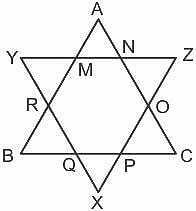











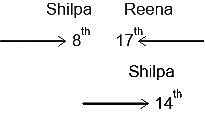
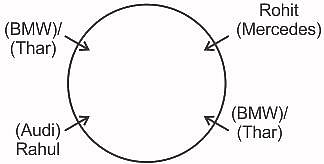
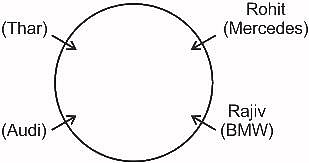
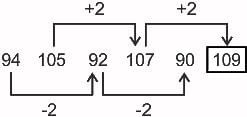


 We can see that "GOOD" is coded as "Be".
We can see that "GOOD" is coded as "Be". We can not decide the code for "GOOD" from this statement.
We can not decide the code for "GOOD" from this statement.